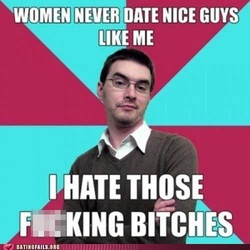
After all, if a guy is nice to a girl, it would be stupid and shallow of her to be attracted to someone who isn't as nice as he is, right?
...Please tell me you aren't nodding your head. If you are, I've got bad news: you've been watching too much TV. And those shows and movies are NOT keeping you single, but the stuff that you're learning from them is.
That goes for you too, ladies. I'm going to focus this post on the guys, but the next one will be for you.
So here is how, in my opinionated opinion, the 'nice guy' dynamic in pop culture is screwing up our relationships and keeping men from being attractive to the women they want:
1. It turns relationships into currency.
You know that moment in a story when a woman gets rescued, and she rewards her protector with a kiss or by falling in love? Yes, there's an element of truth in that - by saving her, he showed that he cares about her, and he probably made a pretty attractive display of bravery and skill in the process.
But by portraying love as a reward for good actions, fiction risks equating it with currency. A guy puts bravery and kindness coins into a girl, and eventually, love and/or sex falls out.
And nothing turns a woman on like knowing she's a product and the 'niceness' is actually a down payment.
What, you don't do that? Let me ask you a question. Do you think the 'friendzone' is a punishment? If you spend time with a girl, and listen to her problems, do you consider that closeness and the trust she's placed in you by baring her soul to be 'wasted effort' on your part if she doesn't become your girlfriend?
If the answer is 'yes', then yes... you were treating her like a product. And, what's more, you weren't being a nice guy - you were trying to make a purchase.
2. It portrays women's romantic decisions as being immature, shallow, or stupid.
If the protagonist has competition for his love interest, chances are, it'll be a charismatic 'bad boy' who doesn't treat her right. The 'bad boy' will be sexy, mysterious, but obviously bad for her... if only she would do the smart thing and hook up with the nice guy!
But no, she's too shallow or stupid. He's rich, he's handsome, he's got 'game', and that's all she cares about. She isn't intelligent enough to know what's good for her. This, of course, takes the onus off the 'nice guy' to discover why she isn't attracted to him; if he waits long enough, maybe she'll grow up and notice him. If not, she wasn't worth it in the first place.
Trouble is, as explained in point #1, it doesn't necessarily work this way in reality, because a lot of real-life 'nice guys' aren't actually nice. They've got an agenda, and they're just as happy to 'play' the women in their lives as the 'players' are - but instead of faking love, they fake friendship. They do nice things, but everything has strings attached.
So if a woman doesn't fall in love with a guy who's wearing a mask and playing her, it isn't because she's stupid. It's because she's smart enough not to get involved with a person who has a hidden agenda!
On the other hand, these 'bad boys' tend to be pretty up-front about who they are and what they want. And even if who they are and what they want is, admittedly, unhealthy in some cases, that honesty is still a lot more attractive than a fake friendship and a mask that looks like what a guy THINKS a woman wants to see.
Let's face it - it's just wish fulfillment.
There are a lot of jilted 'nice guys' out there. Enough that creating a piece of fictional wish fulfillment, in which the girl gets over her bad-boy lover and falls for the nice guy, is a profitable proposition.
"Just be yourself", these stories tell you. Which is great advice, except that a lot of people take it to mean "keep pretending to be the person you're pretending to be, without owning your own preferences and beliefs or being honest about what you want".
"She'll grow up and become attracted to people like you, or else she just isn't worth it", the tales imply, without admitting that sometimes it's their target audience who needs to grow up.
What's your opinion on this?
Do you think my assessment of the situation is accurate? If not, what have I missed?
Are there any other ways in which the fictional portrayal of 'nice guys' is affecting our relationships?
I'd love to hear from you!
And also, stay tuned, because women also make mistakes when it comes to nice guys and relationships, and I'll be exploring them next week.
 RSS Feed
RSS Feed